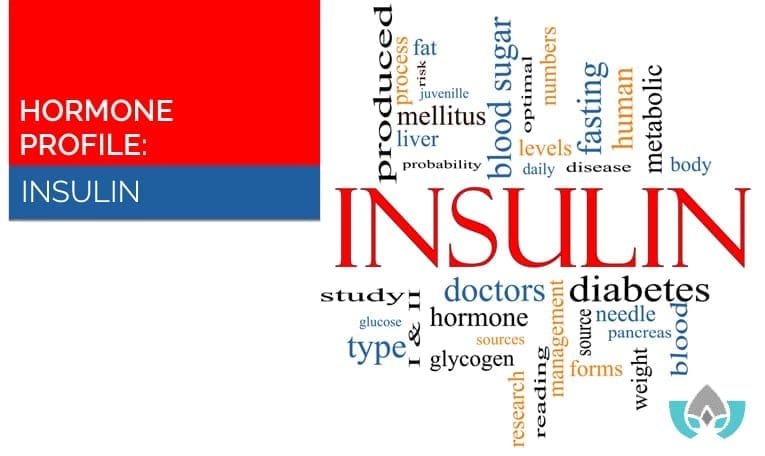
As a naturopath for hormone imbalance in Mississauga, I’ve written about hormones on this blog.
So far we’ve looked at estrogen and testosterone, as well as how to recognize signs of a hormonal imbalance in women.
Hormones are produced by your endocrine system, a part of your body that includes your thyroid, kidneys, liver, sex organs, and more.
Each endocrine organ produces different hormones, which your body needs to stay healthy.
One of these hormones is insulin.
Insulin is produced naturally every time you eat and works by helping glucose entering cells.
However, certain health conditions, such as diabetes, can interfere with your body’s ability to produce its own insulin.
If you’ve been diagnosed with a health condition that’s affecting your insulin levels, you might consider consulting a naturopathic doctor.
At The Mindful Healing Clinic, our skilled Mississauga naturopathic doctors can help you balance your insulin levels to maintain good health.
Keep reading to hear more about insulin’s effects on your body and how a naturopathic doctor can help.
What Is Insulin?
Insulin is a natural hormone that is made in your pancreas, a gland located behind your stomach.
It allows your body to turn glucose into energy.
Glucose is a type of sugar found in many types of foods.
As you eat, food travels through your digestive system, where it’s broken down into nutrients that enter your bloodstream and your body.
Insulin is an essential factor in this process.
Without insulin, your body wouldn’t be able to turn glucose into usable energy.
Where Does Insulin Get Made In The Body?
Your pancreas is responsible for producing insulin.
Your pancreas is a long organ that sits behind your stomach and helps with the digestion process.
As you eat, your pancreas releases insulin to help your body make energy out of glucose and store energy.
It does this by sending out enzymes that break down the fat, starches, and sugars found in your food.
RELATED: 5 Ways Eating Too Much Sugar Hurts You
What Does Insulin Do?
Insulin helps your body with a variety of processes.
Let’s take a closer look at some of insulin’s most important roles in your body.
1. Insulin Helps Glucose Enter Cells
Insulin’s primary responsibility is to help glucose enter cells.
This is where it gets turned into energy.
Without insulin, your cells become starved of energy.
It plays an important role in helping your body turn food into usable and storable energy.
2. Insulin Stores Excess Sugar In Your Liver
Insulin also helps to balance your blood sugar levels.
If too much sugar enters your bloodstream, insulin steps in and tells your liver to begin storing it.
Your liver holds onto this leftover sugar and releases it when your blood sugar levels begin to decrease, such as periods between meals.
3. Insulin Stores Excess Sugar In Your Fat And Muscles
In addition to your liver, your muscles and fat also help store extra glucose to prevent too much from entering your bloodstream.
Once your blood sugar levels begin to rise, insulin instructs your muscles and fat to stop breaking down glucose to prevent more from entering your bloodstream.
Instead, your cells begin to create glycogen, which is a form of glucose which can be stored and released once your blood sugar levels begin to drop.
When your liver can’t hold any more glycogen, insulin instructs your fat cells to begin storing excess glucose by turning it into triglycerides to be used for energy later.
4. Insulin Keeps Your Blood Sugar Balanced
Because it instructs other parts of your body to store excess glucose, insulin plays a vital role in keeping your blood sugar levels balanced.
Having too much or too little glucose in your bloodstream can lead to numerous health complications, such as kidney disease, nerve damage, irritability, and chronic fatigue
By instructing your liver, muscles, and fat to store excess glucose, insulin helps to keep your blood sugar levels within a healthy range.
RELATED: Chronic Fatigue Syndrome Treatment Naturopathic Doctor Near Me.
5. Insulin Keeps Your Cells Happy
Every single cell in your body needs energy to function and maintain health.
Insulin provides this energy through glucose distribution.
Without insulin, glucose remains in your bloodstream and can lead to serious health complications, such as hyperglycemia.
Additionally, insulin helps amino acids and electrolytes like potassium and sodium enter your body’s cells and keep your bodily fluids level.
What Causes The Pancreas To Stop Producing Insulin?
Your pancreas may stop producing insulin effectively for several reasons.
For instance, prolonged insulin resistance may cause the cells that help create insulin in your pancreas to wear out.
Additionally, certain autoimmune conditions, such as inflammatory bowel disease and rheumatoid arthritis, can interfere with your pancreas’ ability to produce insulin.
Finally, prolonged high blood sugar can also impair your insulin production.
To find out more about the many health conditions that may cause your pancreas to stop producing insulin, book your appointment with the Mindful Healing Clinic today.
Health Conditions Associated With Impaired Insulin Production And Insulin Resistance
Let’s take a look at some of the most common health conditions associated with impaired insulin production and insulin resistance.
1. Type 1 Diabetes
Type 1 diabetes is a chronic, autoimmune disease that occurs when your immune system begins mistakenly attacking the insulin producing cells in your pancreas.
The reason this happens is often unknown.
When this happens, your pancreas can’t produce insulin resulting in complications such as nerve damage, kidney disease, heart problems, eye problems, and stomach problems.
If you’re thinking to yourself “where can I find naturopathic treatment for type 1 diabetes?” we can help.
2. Insulin Resistance
Insulin resistance occurs when the cells in your body stop responding to insulin.
Also referred to as impaired insulin sensitivity, insulin resistance may be temporary or chronic.
During insulin resistance, your body stops storing excess glucose in your muscles, fat and liver from your bloodstream.
This can occur for several reasons, including heart disease, obesity, and polycystic ovary syndrome (PCOS).
RELATED: 5 Ways Turmeric Helps With PCOS?
In cases of insulin resistance, the pancreas begins to produce more insulin in an attempt to overcome increasing blood glucose levels.
When insulin resistance isn’t managed, it can lead to…
3. Type 2 Diabetes
Type 2 diabetes, the most common type of diabetes, may occur for one of two reasons.
For some, type 2 diabetes develops because the pancreas can’t produce enough insulin.
For others, type 2 diabetes occurs because their body is experiencing insulin resistance.
Left untreated, type 2 diabetes can result in high blood glucose levels, irritability, confusion, fatigue, and even loss of consciousness.
RELATED: Mississauga Type 2 Diabetes Naturopathic Clinic
How To Balance Your Insulin Levels Naturally
Now that you’ve learned about insulin and its importance for your health, you might be wondering how to go about balancing your insulin levels naturally.
Look below for some naturopathic tips for balancing your insulin levels.
1. Eat Fewer Carbs
Since insulin’s primary responsibility is to help glucose entering cells, eating excess carbs can cause your body to produce too much insulin.
Therefore, reducing your intake of carbohydrates can also help to naturally balance your body’s insulin levels.
2. Avoid Processed Foods With Added Sugar
Processed foods often get a bad rap for their high levels of added sugars.
Unfortunately, their notoriety is mostly deserved.
Despite their tastiness, processed foods can cause your body’s insulin levels to spike.
Therefore, cutting processed foods from your diet can help balance your insulin levels.
RELATED: 3 Reasons Why Added Sugar Is Bad For Your Health
3. Get More Soluble Fibre In Your Diet
Soluble fibre provides many benefits to your health, not least of which is promoting insulin sensitivity.
Diets rich in soluble fibre can increase insulin sensitivity and lower your chance of developing insulin resistance.
Foods rich in soluble fibre include legumes, oatmeal, flaxseeds, and most fruits and vegetables.
4. Eat The Rainbow
Eating plenty of fruits and vegetables are an excellent way to naturally balance your insulin levels.
It’s not a secret that fruits and vegetables play a vital role in keeping your body healthy.
Helping balance your insulin levels is yet another benefit of eating plenty of fruits and vegetables.
In fact, diets rich in fruits and vegetables have been linked to higher insulin sensitivity.

5. Get A Good Night’s Sleep
Many reasons, but in particular, sleep can have a significant effect on your insulin levels.
Research has linked poor sleeping habits with reduced insulin sensitivity.
Additionally, lack of sleep may increase your risk for developing type 2 diabetes.
Therefore, getting enough sleep can be a big help in balancing your insulin levels.
RELATED: How To Combat Insomnia Naturally
Book Your Appointment With The Mindful Healing Clinic Today
Are you interested in getting more tips for balancing your insulin levels?
At The Mindful Healing Clinic, we’re here to help.
Take charge of your insulin levels the natural way – You’re your appointment with The Mindful Healing Clinic today.
Until next time,
Dr. Maria Cavallazzi, N.D
Mindful Healing Naturopathic Clinic
Mississauga, ON L5M 1L7
(905) 819-8200
► https://g.page/MindfulClinicNaturopathic
Dr. Maria Cavallazzi is a medical doctor from Colombia where she practiced as a family physician for 8 years until she moved to Canada 16 years ago and became a naturopathic doctor in Mississauga.


